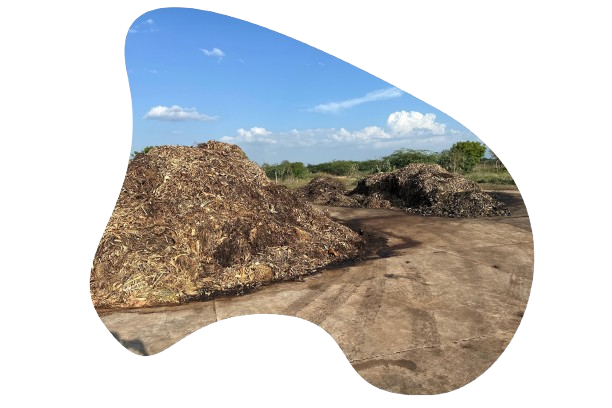
Solving the Waste Management Crisis: Turning Organic Waste into a Climate Solution for Tanzania’s Farmers
Around the world, waste is piling up at alarming rates. According to the World Bank, the planet generates over 2 billion tonnes of solid waste every year, and this number is expected to grow by 70% by 2050 if no action is taken. Alarmingly, about 44% of this waste is organic — food scraps, crop residues, and other biodegradable materials that could be turned into valuable resources.
In many places, this organic waste is either dumped in open landfills or burned in the open air. Both practices have serious environmental consequences. Open dumping allows waste to decompose without oxygen, producing methane gas, a greenhouse gas over 25 times more potent than carbon dioxide. Burning waste releases harmful pollutants into the air, affecting both human health and the climate.
The Situation in Africa and Tanzania
Africa faces unique waste management challenges. Rapid urbanization, population growth, and limited waste collection infrastructure mean that much of the waste generated — especially in rural areas — is poorly managed. In Sub-Saharan Africa, the World Bank estimates that 57% to 65% of all municipal waste is organic, yet only a tiny fraction is recycled or composted.
In Tanzania, the problem is especially visible in agricultural communities. Markets, restaurants, and households generate large amounts of organic waste daily. Instead of being used productively, much of it is dumped or burned. At the same time, small-scale farmers — who make up the majority of the agricultural workforce — struggle to afford or access quality soil amendments. Many resort to expensive chemical fertilizers, which can harm soil health over time and reduce its natural fertility.
Why Composting Matters
Composting is one of the most effective ways to turn organic waste into a resource. It’s a natural process that uses microorganisms to break down biodegradable materials into a nutrient-rich soil amendment. Good compost can:
- Improve soil structure and increase its ability to hold water
- Add essential nutrients for crops, reducing the need for chemical fertilizers
- Boost microbial activity in the soil, which helps plants grow stronger and healthier
- Reduce greenhouse gas emissions by preventing methane release from landfills
For farmers, composting offers a win-win solution: it lowers farming costs while improving productivity and resilience to climate change. For communities, it reduces waste and pollution.
Our Innovative Approach: Using Microbial Engineering
While traditional composting methods can take months to produce usable compost, innovations in microbial engineering are changing the game. By introducing specially selected microorganisms into the composting process, organic matter can decompose faster and more efficiently.
At Zona Enterprise Ltd, we are using natural microbial composting techniques to cut composting time and produce high-quality compost that meets the needs of farmers. Our process ensures the compost is:
- Rich in nutrients for healthy plant growth
- Free from harmful pathogens
- Produced in a fraction of the time compared to traditional methods
This means farmers can have reliable access to affordable compost year-round, helping them improve yields by up to 20% while reducing dependence on costly synthetic fertilizers.
Empowering Farmers Through Training
Beyond selling compost, we are committed to building farmers’ capacity in sustainable farming practices. This includes hands-on training on how they can produce compost from locally available materials, integrate it into their farming systems, and adopt regenerative agricultural techniques that protect the environment while improving yields. We aim to reach 500 farmers in the next 2 years — ensuring that knowledge and resources spread far beyond our immediate reach.
A Global Platform for Local Solutions
In September 2024, Zona Enterprise’s Project Lead, John Shayo, attended the One Planet Network Forum in Rio de Janeiro — a gathering focused on Sustainable Consumption and Production (SCP). John shared how community-led waste management initiatives like ours can transform not just the environment, but also local economies. Inspired by discussions on inclusivity and economic empowerment, we recognized an even greater need to integrate women farmers and youth into our compost supply chain.
For us at Zona Enterprise, this means:
- Creating targeted training programs for women and youth farmers
- Partnering with women-led cooperatives to expand compost distribution
- Exploring ways our organic waste collection process can create dignified jobs for rural women
The Rio experience reinforced our belief that environmental action and social empowerment must go hand in hand. We are not just tackling waste — we are creating opportunities, lifting others as we climb, and ensuring that climate solutions are community solutions.
Youth4Climate’s Role in Driving Change
This work is made possible through support from the Youth4Climate initiative, under the United Nations Development Programme (UNDP). Youth4Climate empowers young leaders across the globe to develop and scale innovative climate solutions that tackle pressing environmental challenges in their communities. Through this partnership, we are scaling our composting initiative to:
- Train at least 500 farmers on sustainable farming practices
- Teach farmers how to produce their own compost using available organic waste
- Divert significant amounts of organic waste from landfills and open burning
- Reduce methane and other greenhouse gas emissions from decomposing waste
By combining modern composting techniques with community-based training, we aim to create a ripple effect — where farmers not only improve their own productivity but also become advocates for climate-smart agriculture in their villages.
Looking Ahead
Our vision is simple but powerful: Healthy soil, healthy food, healthy communities. By transforming waste into a valuable resource, we can fight climate change, reduce pollution, and strengthen rural livelihoods. With Youth4Climate’s support, this is more than just a waste management project — it’s a movement towards a regenerative future for Tanzania’s farmers, where nothing is wasted, and every resource is valued.